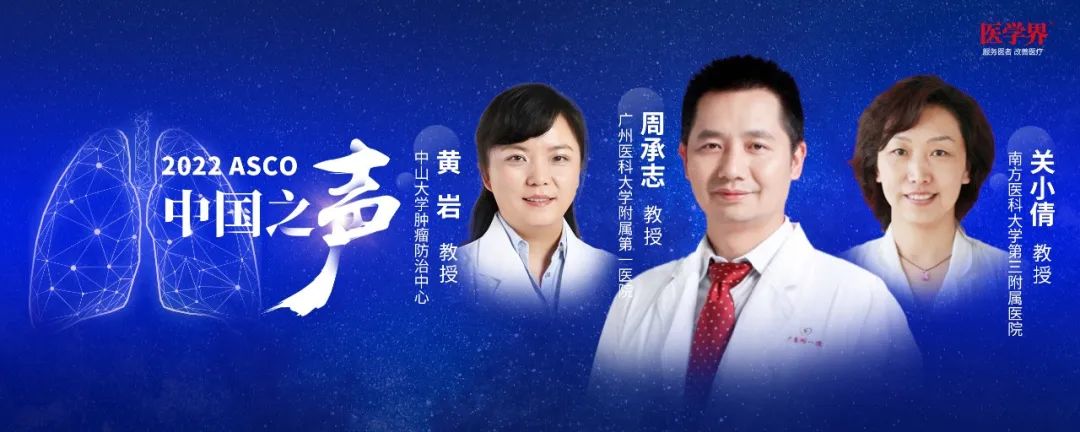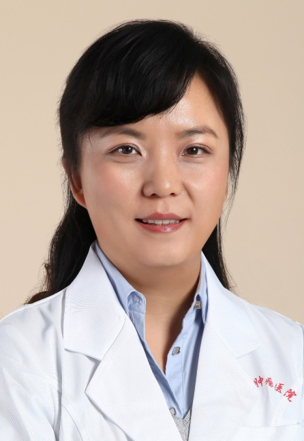2022 ASCO 丨 Professor Zhou Chengzhi, Professor Huang Yan, Professor Guan Xiaoqian talked about ALK -positive NSCLC clinical diagnosis and treatment
Author:Cancer Channel of the Medical Time:2022.07.23
*For medical professionals for reading reference

After the long survival, how to clinically perform ALK -positive NSCLC chronic disease management?
Lung cancer is the largest cancer in my country. It is divided into non -small cell lung cancer (NSCLC) and small cell lung cancer (SCLC). NSCLC accounts for about 85%[1]. Among all NSCLC patients, about 2%-7%of interior degeneration lymphomin kinase (ALK) gene mutations [2,3]. In the past 10 years, with the in -depth understanding of lung cancer molecular biology and the development of targeted drugs, targeted therapy has completely changed the treatment pattern of Alk positive NSCLC. Cizibinini, as the world's first ALK-Typenase Kinase inhibitor (TKI), has played an important role in this.
The annual conference of the American Society of Clinical Oncology (ASCO) is the world's largest tumor academic event. It is considered to be the "vane" of tumor treatment. It can bring new therapeutic concepts and means to tumor treatment every year. This year's ASCO Annual Meeting was held in the form of online and offline from June 4th to 8th in the United States time to take this opportunity. The "medical community" specially invited Professor Zhou Chengzhi of the First Affiliated Hospital of Guangzhou Medical University and the tumor of Sun Yat-sen University. Professor Huang Yan and Professor Guan Xiaoqian of Southern Medical University and the Third Affiliated Hospital of Southern Medical University combined with ASCO related content this year to discuss and analyze the current ALK positive NSCLC clinical diagnosis and treatment.
Targeted therapy casts for the long -term ALK -positive NSCLC survival
In 2009, the iPass research [4] opened the prelude to the targeted therapy of lung cancer, and brought disruptive changes to the treatment structure of advanced NSCLC, which greatly improved the survival benefits of patients. Among them, ALK -positive NSCLC patients benefit significantly after receiving targeted treatment, and ALK mutations were therefore named "diamond mutation". In recent years, the R & D and clinical applications of Alk-TKI have made great breakthroughs. The objective relief rate (ORR) and non-progressive survival time (PFS) of patients with late NSCLC patients in ALK positive NSCLC have been further improved.
In this regard, Professor Zhou Chengzhi said that the earliest classic research on ALK -positive NSCLC targeted therapy was Profile 1014 Studies [6, 7]. The study shows that compared with chemotherapy, the first -line therapy ALK -positive NSCLC can significantly prolong patients with median PFS and overall survival (OS), and open the door of ALK -positive NSCLC targeted therapy. This is for ALK NSCLC targeted therapy is a milestone.
After that, with the emergence of more ALK-TKI, more and more ALK-positive late NSCLC patients have gained long survival by receiving targeted therapy. According to the 68-month (5.6 years) follow-up data of the J-Alex of the 2021 ASCO Annual Meeting [8], the patients who received the control group for Kizotinib were not treated with the patients who were treated with Alaitinib therapy. Obvious differences (the median OS: 68.6 months; the median OS: 68.0 months of the Kazidinib group), there are no significant differences in the five -year OS rate in the two groups (the five years of the Alaitinib group OS OS Rate: 60.85%; Cizidinini group five -year OS rate: 64.11%).
Not only that, a real world study announced by the ASCO Annual Meeting this year shows that after the first-line accepted Cizetinib for patients with ALK positive NSCLC, different treatment plans, the median OS can reach 60.4 months (95%CI 54.0-85.5.5.5.5 To. Earlier, a number of real-world research or retrospective studies have shown that the treatment plan for the second-generation Alk-TKI of Kradinini sequences can bring patients with a median OS of more than 85 months [9-11]. Subsequently, Professor Zhou Chengzhi emphasized that the 5 -year OS rate of more than 50%can be regarded as a "chronic disease". The above studies not only confirmed that ALK mutations can indeed be called "diamond mutation", but also made ALK -positive NSCLC expected to become the first lung cancer subtype to achieve "slow disease". Therefore, tumor clinical workers must allow such patients to use targeted drugs when treating ALK -positive NSCLC, and at the same time managed the whole process to strive for the best survival of patients.
In the future, ALK -positive NSCLC will become more and more accurate
At this year's ASCO Annual Meeting, a study conducted by domestic scholars [12] showed that among the patients who were treated with cizotinib, there were only a single ALK fusion patients. 13.8 months vs. 8.4 months, P = 0.008), EML4-ALK fusion patients with median PFS better than non-EML4-ALK fusion type patients (18.2 months vs. 8.5 months, P = 0.035).
Professor Huang Yan pointed out that with the continuous development and progress of medicine, more and more ALK's rare mutations will be discovered by people, and the effects of different mutant types of patients have different effects when receiving targeted treatment. For patients with different rare mutations, it is still lacking of high -level evidence. But it is certain that the treatment of ALK -positive NSCLC must be moving towards a more accurate direction.
In addition, relevant studies have shown that patients who receive different Alk-TKI treatment can produce different new mutations and lead to drug resistance. [13] At this year's ASCO Annual Conference, some scholars pointed out in the case discussion session that "the ALK mutation diagram covered by each ALK-TKI is different, but currently lacks evidence based on different mutations or drug resistance mechanisms."
Professor Guan Xiaoqian said that although targeted therapy can bring good survival benefits to patients, it will inevitably face the treatment of drug resistance. Therefore, the drug tolerance mechanism is always one of the key issues of clinical care. At present, the drug resistance of the first and second-generation ALK-TKI drug resistance mechanisms has been relatively deeply recognized. The resistance generated by the first-line and first-generation TKI Cizibinib therapy can be solved through the descendants of Alk-TKI and accepted the first line of the first line. For Alk-TKI resistance, some of which can be solved through three generations of Alk-TKI, and the three-generation Alk-TKI first-line treatment mechanism is not clear, and it is expected that subsequent research to solve this problem. Only by solving drug resistance can ALK -positive NSCLC patients truly achieve precise treatment.
Professor Zhou Chengzhi also emphasized that the ALK -positive NSCLC drug resistance mechanism can form a "closed loop" at some point. Some patients may still have a certain effect by receiving "re -challenge" treatment by previous drugs. In the future, how to accurately find such people through dynamic genetic testing, create another treatment window for them, and exert the efficacy of targeted therapy to extremes.
High -quality treatment plan cannot only consider clinical effects
On the basis of providing accurate treatment for patients, it is also very important to formulate a reasonable comprehensive treatment plan for patients. Professor Guan Xiaoqian said that most ALK-TKI currently has good accessibility, but it is worth noting that for ALK-positive NSCLC, especially after ALK-TKI treatment, it is a kind of Treatment choice.
Later, Professor Guan Xiaoqian shared a case for us. After 11 months of applied Kizinib for patients, patients were resistant to drugs. At this time, other targeted drugs were not available. Targeted local treatment. Unfortunately, the patient appeared again half a year later, so he was treated with patients with platinum chemotherapy combined with Bevarzumab. It was unexpected that the patient received 18 months of PFS, which is also the longest PFS during the patient treatment period. Essence It can be seen that after ALK-TKI is resistant, chemotherapy combined with anti-vascular treatment schemes also have the potential to extend patient's survival.
In addition, high -quality treatment plans must not only consider fighting longer survival for patients, but also comprehensively consider the treatment of treatment during the treatment of patients, interactions between different therapeutic drugs, and the economic burden of patients.
In this regard, Professor Huang Yan also said that most ALK-TKI has been covered by medical insurance, and Kzhinib has entered the country for more than 10 years. Clinicians have rich application experience in it. In the future, as more drugs are included in medical insurance, I believe that no matter in targeted sequential treatment or multiple comprehensive treatment solutions, there will be more room for discussion.
Expert Introduction
Professor Zhou Chengzhi
Chief physician, doctoral supervisor
Guangzhou Respiratory Health Research Institute, the First Affiliated Hospital of Guangzhou Medical University, Deputy Director of the Clinical Management Department of the National Respiratory Medical Center, deputy director of the disciplines of respiratory and critical condition, director of respiratory five districts (tumors 1 district), and assistant director of the oncology center. Internationally, it is the first to propose the concept of "severe lung cancer", and proposes the whole management concept of "cancer lungs", "PS scores with reversible and volatility", and "anti -tumor drug upgrades".
Academic position:
Deputy Leader of the Chinese Medical Association's Respirat
Councilor of the Chinese Physician Association Breathing Branch
The Secretary -General of the Chinese Respiratory Tumor Cooperation Group (CROC) and Deputy Chairman of the Youth Committee
Member of the Youth Committee of the China Clinical Oncology Society (CSCO) and Education Commission
Chairman of the Chairman of the Society of Tumor Critical Cruculum of chest tumor diseases in Guangdong Province
The chairman of the Lung Cancer Branch of the Guangdong Precision Medicine Society
Deputy Leader of the Lung Cancer Team of Respiratory Diseases in Guangdong Medical Association
Deputy Chairman of the Guangdong Medical Association's lung oncology branch
Deputy Chairman of the Cancer Association of the Guangdong Medical Association
Expert Introduction
Professor Huang Yan
Doctor, chief physician, doctoral supervisor, doctoral supervisor, doctoral supervisor and doctoral supervisor of Sun Yat -sen University

Social work:
Chairman of the Cancer Rehabilitation and Prices of Cancer Association of Guangdong Province
Deputy Chairman of the Chemotherapy Professional Committee of the Guangdong Provincial Anti -Cancer Association
Deputy Chairman of the Precision Medical Professional Committee of the Guangdong Society of Clinical Medicine
Executive Member of the Professional Committee of Cancer Rehabilitation and Passing Treatment of China Anti -Cancer Association
CSCO tumor support and rehabilitation therapy expert committee executive member
Member of the Professional Committee of Cancer Drug Clinical Research of China Anti -Cancer Association
Expert Introduction
Professor Guan Xiaoqian
Chief physician

Director of Cancer Department of the Third Affiliated Hospital of Southern Medical University
Director of the Director of Quality Management and Evaluation Section
Deputy Chairman of the Professional Committee of the Cancer Association of Guangzhou Anti -Cancer Association
Deputy Chairman of the Cancer Professional of the Guangdong Medical Education Association
Executive Member of the Cancer Internal Science Branch of the Guangdong Medical Association
Executive Member of the Sabble Professional Committee of the Guangdong Anti -Cancer Association
Executive Member of the Gastrointestinal Tumor Committee of the Guangdong Female Physician Association
Member of the Freckage and Chemotherapy Group of the Chinese Anti -Cancer Association Sabble Society
Deputy Chairman of the Quality Management Committee of the Guangdong Medical Education Association Hospital
Executive Member of the Medical Management Professional Committee of Guangdong Provincial Hospital Association
Executive Member of the Quality Management Professional Committee of the Guangdong Provincial Hospital Association Hospital
Executive Member of the Guangdong Pharmaceutical Association Medical Policy Management Committee
Executive Member of the Medical Management Professional Committee of the Guangdong Female Physician Association
Consultant Committee of the Expert Committee of the Guangzhou Medical Revidence Quality Control Center
references:
[1] Hong Shaodong, tension, lung cancer targeting new progress and outlook [J]. China Cancer Magazine, 2020, 30 (10): 733-743.
[2] Kris M G, Johnson B E, Berry L D, et al. USING Multiplexed Assays of Oncogenic Drivers in LUNG CANCERS to Select Targeted Drugs [JAAMA, 2014, 311 (19): 1998-2006.
[3] Miyanaga A,Shimizu K,Noro R,et al.Activity of EGFRtyrosine kinase and ALK inhibitors for EML4-ALK-rearranged non-smallcell lung cancer harbored coexisting EGFR mutation[J].BMC Cancer 2013,13:262.
[4] MOK TS, Wu yl, Thongprasert S, et al. Gefitinib or Carboplatin-Paclitaxel in Pulmonary Adenocarcinoma [J]. N Engl J Med. 2009, 361 (10): 947-57.
[5] China's non -small cell lung cancer ALK detection mode Real world multi -center research expert group, Molecular pathology group of the Chinese Medical Association Pathology Branch. Chinese non -small cell lung cancer ALK test clinical practice expert consensus [J]. Chinese pathology magazine, Chinese pathology, 2019,48 (12): 913-920.
[6] Solomon BJ, MOK T, Wu YL, Et Al. FIRST-LINE CRIZOTINIB Versus Chemotherapy in Alk-POSITIVE LUNG CANCER [J]. N ENGL J Med. 2014: 2167-77.
[7] Solomon BJ, Kim DW, Wu YL, et al. Final Overall Survival Analysis From a Study Comparing First-Line Crizotinib Versus Chemotherapy in ALK-Mutation-Positive Non-Small-Cell Lung Cancer. J Clin Oncol. 2018, 36 (22):2251-2258.[8] Hiroshige Y, Toyoaki H, Hiroshi N, et al. Final OS analysis from the phase III j-alex study of alectinib (ALC) versus crizotinib (CRZ) in Japanese ALK-inhibitor naïve Alk-positive non-Small Cell LUNG CANCER (ALK+ NSCLC) ASCO 2021 ABSTRACT 9022.
[9] Duruisseaux M, Besse B, Cadranel J, et al. Overall survival with crizotinib and next-generation ALK inhibitors in ALK-positive non-small-cell lung cancer (IFCT-1302 CLINALK): a French nationwide cohort retrospective study[ J]. Oncotarget. 2017, 8 (13): 21903-21917.
[10] Watanabe S,Yamanaka T,Ito K,et al.The sequential therapy of crizotinib followed by alectinib:Real world data of 840 patients with NSCLC harboring ALK-rearrangement (WJOG9516L)[EB/OL].WCLC 2019,abstract OA02 .06.
[11] Pacheco JM,Gao D,Smith D,et al.Natural History and Factors Associated with Overall Survival in Stage Ⅳ ALK-Rearranged Non-Small Cell Lung Cancer[J].J Thorac Oncol,2019,14(4): 691-700.
[12] xinliang zhou, liyuan he, zhisong fan, et al. ALK FUSION TYPING and Response to crizotinib in alk+ Lung Cancer-Naive Patients. 2022 ASCO, ABSTRACT E21008.
[13] Lin YT, Chiang CL, Hung JY, et al. Resistance profiles of anaplastic lymphoma kinase tyrosine kinase inhibitors in advanced non-small-cell lung cancer: a multicenter study using targeted next-generation sequencing[J]. Eur J Cancer . 2021, 156: 1-11.
*This article is only used to provide scientific information to medical people, and does not represent the viewpoint of this platform


- END -
Four people died and 13 were injured.

At 7:15 on July 19th, a gas degeneration accident occurred in the home of 6, Huany...
Want to control sugar, sugar -free food can't taste randomly

Nowadays, the harm of high sugar intake has attracted increasing attention, and su...